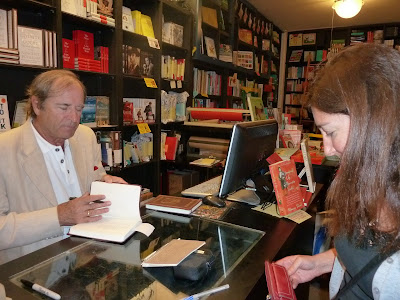Sitting at Paul Theroux’s feet
I literally sat at Paul Theroux’s feet for his book reading from the Tao of Travel at Book Soup. His books have greatly influenced George and I in our ideas of where to go and what to write about. Theroux talks in the Ghost Train to the Eastern Star: On the Tracks of the Great Railway Bazaar about writing about the dirty parts of travel when you are literally dirty and when things don’t go well and also about the characters on the road that enliven your travels.
His new book talks about types of travelers and travel books: those in search of food, who travel to break a record, who travel alone or “lie” about being alone, learning about how long do people stay in a place, those who survive an ordeal, those who never actually went to a place they write about, and those who stay home like Emily Dickinson. I enjoyed hearing the categories from the books and his incredible anecdotes about different authors and locations.
I especially liked the discussion about how “everything is edible somewhere.” We saw dogs, frogs, fish and ducks in a market in China. I had also heard there what he said, “dog meat is good in the winter.” I am still not sure why and I am still not going to eat it.
In answer to the question, “are you still traveling?,” Theroux said “it is a stimulating way to live my life.” I agree travel is amazing. When asked about writing, he said, “Writing is not hard. Living is hard. Being a plumber lying on your back is hard; writing is not hard. Art is easy. Life is difficult.” It is interesting that so many people claim writing is a challenge but maybe the challenge is actually having something to say. Theroux did say that to “sit in a room all the time, sitting and writing beats virtually every other kind of work….but after being indoors for a year, I feel like getting out.”
As to his list for where to travel to next, his response was to read the book! There are so many places on his list including Greenland, Angola, and the American South. Theroux warmly praised our country and said, American “mountains, and our deserts stand up against many other countries.”
I asked my question about a book by travelers traveling together. It was not in his list of categories of types of travelers or travel books. He had earlier said that the travel shelf is “a very confusing shelf.” There is so much that is considered travel writing. His first interpretation of my question was that when people travel in a couple they are distracted from where they are by their traveling partner. More so in a group, when you are in a group it is hard to engage with the place. I agree with that. However, George and I travel together and do feel connected to the places we go.
Later I told Mr. Theroux, “you did not answer my question.” So he did tell me, he could not think of a great travel book written by a couple. George told him we were working on a book about our adventures for a year in Asia. Paul Theroux said “Great! Go for it!” We feel inspired by our time spent literally sitting at the feet of the great travel writer, Paul Theroux.

He took other questions about writing and traveling, “write everyday. Do not paraphrase people. Write the dialogue.” About women in his book, “there are plenty of them in my book.” He was asked about using guidebooks and said while detailed maps are his first influence, he highly praised the Lonely Planet Guidebooks. He also said “the hard part isn’t being in a country but going from one country to another.” I have personally found overland crossings to be fascinating and was interested that Theroux also used the Lonely Planet series.
I found it most interesting when Theroux spoke about friendship. He said, “not enough is written about friendship. Friendship is a great subject.” He said many people write about love but not the nature of friendship. He also talked about how truthful are his books, “When I travel, I try to be scrupulous about where it happened.” He does sometimes change the name of the people but said, unlike Bill Bryson who sometimes “conflates two people he meets into one character in the story,” he likes an accurate description of the trip so that other people can do it also. “All as it is and tell it the way it happened.”
During his final reflection on why he was fascinated by train travel and fresh air, he talked about his youth and his mother. His mom always said, “Go outside!” She might not have realized how far he would end up going!
Lisa Niver Rajna is the Geography Awareness Editor for Wandering Educators. You can find her at http://www.WeSaidGoTravel.com


















